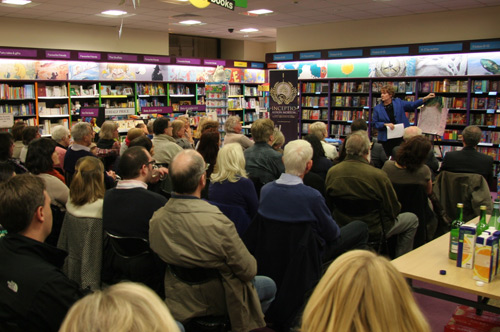 Alison Morton is the author of the Roma Nova thriller series – all B.R.A.G. Medallion honorees! Her latest is AURELIA featuring a new heroine pursuing silver smugglers in the late 1960s.
Alison Morton is the author of the Roma Nova thriller series – all B.R.A.G. Medallion honorees! Her latest is AURELIA featuring a new heroine pursuing silver smugglers in the late 1960s.
It’s the day. You have a mass of faces in front of you. You are alone in the arena and the lions are pacing back and forth, tongues salivating. The be-tunicked and be-toga-ed are watching, a smile on their lips, ready to be entertained, but their thumbs are ready…

No, this isn’t Ancient Rome, although it may feel like it as you stand there, notes in trembling hand, praying that the PowerPoint will work and that nobody will laugh or boo. An exaggeration, perhaps, but speakers today at events are expected to be as entertaining and as quick on their feet as ancient gladiators.
Sometimes people who are expert in their field are not happy to speak to an audience. This is a shame as they may the very people we’d like to hear from. Now, I like standing up in front of people, but that’s not enough. I still agonise about whether I have too much or too little material or if I’m pitching it at the right level for the audience.
Before I started writing novels, I gave talks to audiences from 6 up to a 1,000 about translation, cultural differences and business topics. Now, I give talks, serve as a panel member and lead workshops in the writing world, but I still tense up before I go on. Actually, it can be quite positive to be a little nervous because it pushes you to make an extra effort. However, you can reduce the core anxiety factor by over 90% with good preparation.
Dare to do it. Nobody is going to eat you (It’s against the law.) and quite a lot of people would like to hear from you. Obviously, you need to know the subject area and that in itself breeds confidence. If an organiser asks you to speak, say yes. Once booked, you’re unlikely to backslide.
Agree the topic and scope with the organiser. Don’t be afraid to go into detail and ask questions. Audiences remember you better if you talk about what they’ve come to hear. It’s quite shocking how many events I’ve been to where the topics differed from the title on the programme. The most notable one was at the 2014 London Book Fair. I chatted to the speaker afterwards and discovered she’d been given the wrong briefing!
Start gathering your ideas early The longer lead time, the better. You could come across some terrific new research as you prepare, or meet a new person to consult, or a find new way of presentation if you start early. Unlikely, if you leave it until the week before.
Write it all out You’re probably not going to read it verbatim, but composing your talk in your head and tapping it into your computer means that the thoughts go through your brain and hopefully stick there, and possibly mature. When you’re ready, you can reduce the meat of your talk to bullet points on postcards, iPad, or your memory, whichever is most comfortable for you.
 Use slides/pictures/objects/maps/charts, but…
I like images, so perhaps I’m biased. I always have illustrations in every blog post I write; they break up the narrative and give readers a chance to absorb what I’ve written. They may even be amused. So it is with talks. Charismatic speakers don’t use props, but most of us, while we engage, we are not in that class.
Use slides/pictures/objects/maps/charts, but…
I like images, so perhaps I’m biased. I always have illustrations in every blog post I write; they break up the narrative and give readers a chance to absorb what I’ve written. They may even be amused. So it is with talks. Charismatic speakers don’t use props, but most of us, while we engage, we are not in that class.
And here’s the ‘but’…
Do NOT depend on images and slides or you could be stuck like a cat up a tree with no firefighter to rescue you. If the technology fails, you must still be able to give your talk.
On the day, take deep breaths Aim to speak slower than normal – everybody, except the complete expert, speaks faster out of nervousness. And if you get lost or befogged during your talk, pause, take a breath, glance at your notes to gather yourself together. You’ll soon recover because you’ve practiced this darn talk so many times, you know exactly where you are.
 And answer questions nicely
You haven’t finished yet. Look and smile at the questioner even if you think they resemble the tough interrogator from the local vigiles cohort in ancient Rome. While there will be some nit-pickers, you may be surprised by how supportive some of the questions are. And lastly, don’t try to fluff an answer. If you don’t know, offer to find out and email them later.
And answer questions nicely
You haven’t finished yet. Look and smile at the questioner even if you think they resemble the tough interrogator from the local vigiles cohort in ancient Rome. While there will be some nit-pickers, you may be surprised by how supportive some of the questions are. And lastly, don’t try to fluff an answer. If you don’t know, offer to find out and email them later.
Thank you for reading – I hope you’ve enjoyed it.
Does anybody have any questions?
Always good to hear about public speaking, Alison. It helps us all to know how each person deals with it. Thank you.
All helpful and useful reminders of how to face the lions!